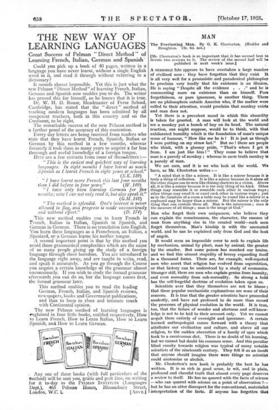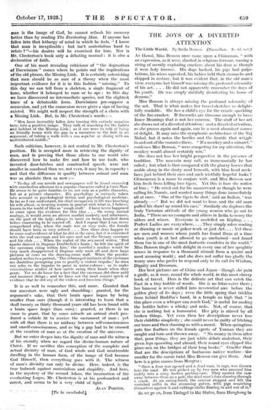MAN
The Everlasting Man. By G. K. Chesterton. (Hodder and Stoughton. 12s.-6d. net.) _ (Mr. Chesterton's book is so important that it has seemed best to devote two reviews to it. The review of the second half will ha published in next week's issue.]
A TERRIBLE fate appears to have overtaken a large number of eivilized men : they have forgotten that they exist It is all very well for a pessimistic and paradoxical philosopher to proclaim very loudly that his existence is an illusion. He is saying " Despite all the evidence. . ." and he is
commenting more on existence than on himself. Pure forgetfulness, or pure ignorance, is another thing. There are no philosophers outside America who, if the matter were called to their attention, would proclaim that monkey exists and man does not.
Yet there is a prevalent mood in which this absurdity is taken for granted. A man will look at the world and see a monkey put a bunch of hay on its head. The natural
reaction, one might suppose, would be to think, with that exhilarated humility which is the foundation of man's unique
sense of humour, " How like me he is ! It is just as though I were putting on my straw hat." But no ! there are people who think, with a gloomy pride, "That's where I get it from. I am just like him ! " They come to believe that man is a parody of monkey ; whereas in mere truth monkey is a parody of man.
We are men, and it is we who look at the world. We have, as Mr. Chesterton writes :—
" A mind that is like a mirror. It is like a mirror because it is truly a thing of reflection. It is like a mirror because in it alone all the other shapes can be seen like shining shadows in a vision. Above all, it is like a mirror because it is the only thing of its kind. Other things may resemble it or resemble each other in various ways other things may excel it or excel each other in various ways ; just as in the furnitiue of a room a table may be round like a mirror or a cupboard may be larger than a mirror. But the mirror is the only thing that can contain them all Man is the microcosm ; man is the measure of all_things ; man is the image of God."
Men who forget their own uniqueness, who believe they can explain the consciousness, the character, the essence of man from anything else in the created world—such men forget themselves Man's kinship is with the uncreated world, and he can be explained only from God and the host of angels.
It would seem an impossible error to seek to explain life by mechanism, animal by plant, man by animal, the greater by the smaller.. But some poison has numbed our brains, and we find this utmost stupidity of heresy expanding itself
in a thousand forms. There are, for example, well-reputed men who assert that religion has evolved from superstition,
or that history can be understood by a study of economics. Stranger still, there are men who explain genius from insanity, and even normality from sub-normality. So strong a hold has the self-forgetful doctrine of evolution taken upon us.
Scientists aver that they themselves are not to blame ; that these popular mechanistic explanations are none of their concern. It is true that the greater scientists have proceeded modestly, and have not professed to do more than record the processes of physical evolution in the world. It is true, too, that the failure of wonder and alertness and self-know- ledge is not to be laid to their account only. Yet we cannot acquit them entirely of oversight and ignorance. A certain learned anthropologist comes forward with a theory that attributes our civilization and culture, and above all our religion, to the sudden aberration of a family of apes which took to a carnivorous diet. There is no doubt of his learning, but we cannot but doubt his common sense. And this peculiar blind enmity towards religion was typical of many notable scientists of the nineteenth century. They felt it as an insult that anyone should imagine there were things no scientist could anatomize or abolish.
Mr. Chesterton's new book is probably the best he has written. It is so rich in good sense, in wit, and in plain, profound and cheerful truth that almost every page deserves a review to itself. He has no quarrel with the facts of science —who can quarrel with science on a point of observation ?-
but he has an utter disrespect for the conventional, materialist interpretation of the facts. If anyone has forgotten that man is the image of God, he cannot refresh his memory better than by reading The Everlasting Man. If anyone has
fallen into that lethargy of mind in which he feels, " I know that man is inexplicable ; but isn't materialism hard to refute ? "—his doubts will be exorcised for him. Nor is Mr. Chesterton's book only a debating manual : it is also a declaration of faith.
One of his most revealing criticisms of " the dogmatism of Darwinians " comes where he points out the implications of the old phrase, the Missing Link. It is certainly astonishing that men should be so sure of a theory when the most important evidence for it is in this fashion " missing." To this day we can tell from a skeleton, a single fragment of bOne, whether it belonged to man or to ape : to this day we have discovered no intermediate species, not the slightest trace of a debateable form. Darwinians pre-suppose a connexion, and yet the connexion never gives a sign of having existed. We might well suspect the strength of a chain with a Missing Link. But, in Mr. Chesterton's words :—
" Men have insensibly fallen into turning this entirely negative term into a positive image. They talk of searching for the habits and habitat of the Missing Link ; as if one were to talk of being on friendly terms With the gap in a narrative or the hole in an argument, of taking a walk with a non sequitur or dining with an undistributed middle."
Such criticism, however, is not central to Mr. Chesterton's position. He is occupied more in retrieving the dignity of man, and in proving that those aliens to our world who
discovered how to make fire and how to use tools, who invented door-latches and constructed speech, were not smaller in manhood than we, not even, it may be, in capacity : and that the difference in quality between animal and man was as absolute then as now :—
" To-day all our novels and newspapers will be found swarming with numberless allusions to a popular character called a Cave-Man. He seems to be quite familiar tows, not only as a public character, but as a private character. His psychology is seriously taken into account in psychological fiction and psychological medicine. So far as I can understand, his chief occupation in life was knocking his wife about, or treating women in general with what is, I believe, known in the world of film as ' rough stuff.' I have never happened to come upon the evidence for this idea . . . On every animal analogy, it would .seem an almost morbid modesty and reluctance, on the part of the lady, always to insist on being knocked down before consenting to be carried off. And I repeat that I can never comprehend why, when the male was so very rude, the female should have been so very refined . . . Now there does happen to be some real evidence of what he did in the cave, but it is concerned with the real caveman and his cave and not the literary caveman and his club . . . When the realist of the sex-novel writes, ' Red sparks danced in Dagmar Doubledick's brain ; he felt the spirit of the caveman rising. within him,' the novelist's readers would be very much disappointed if Dagnitir only went .off and drew large pictures of cows on the drawing-room wall. When the psycho- analyst writes to a patient, ' The submerged instincts of the caveman are doubtless prompting you to gratify a violent impulse,' he does not refer to the impulse to paint in water-colours ; or to make conscientious studies of how cattle swing their heads when they grate. Yet we do know for a fact that the caveman did these mild and innocent things ; and we have. not the most minute speck of evidence that he did any of the violent and ferocious things. ' . .
It is as well to remember this, and more. Granted that our ancestors were ugly and shambling : granted, for the
argument's sake, that their brain space began by being smaller than ours (though it is interesting to learn that a skull twenty or thirty thousand years old has been found with
a brain space larger than ours) : granted, as there is no muse to grant, that by some miracle an animal stock pro- duced a vehicle fit to receive the sacrament of man : yet with all that there is no midway between self-consciousness
and unself-consciousness, and as big a gap had to be crossed at the creation of man as at the creation of the universe.
....But we enter deeper into the dignity of man and the witness of his eternity when we regard the divine-human nature of Christ. If we sacrifice this conception of the complete and actual divinity of man, of God whole and God 'unutterable dwelling in the human form, of the image of God become God Himself, then everything goes with it. The witness
of man's divinity can only be divine. Here, 'indeed, is the true bulwark against materialism and stupidity. And here, in the mystery of the second Adam, the incarnation of the everlasting Logos, Mr. Chesterton is at 'his profoundest and surest,' and seems to be a very child of light.
ALAN PORTER.
[To be concluded.] - • - -



















































 Previous page
Previous page